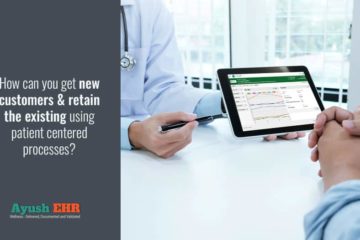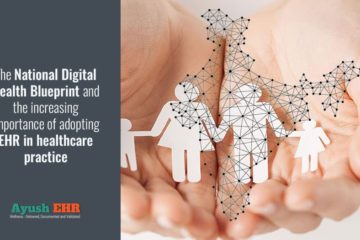Top 6 ways in which EHR software helps Ayurveda Clinical Research

The evolution and maturing of Ayurveda Industry is the result of various researches, scrutiny and validation over the years. It has contributed it’s share to the evolution of healthcare through crucial medical research of it’s own. But unlike Allopathy, it has been challenging to get factual & authentic clinical information in Ayurveda for effective clinical research. Traditionally, there has been no established standard record keeping practice to help validate the treatments practices and cure.
In modern Ayurveda practices such as resorts, clinics and hospitals EHR software solutions help document their treatments, streamline their operations and make them more efficient. Researchers should leverage the clinical data created by such EHR software to facilitate clinical research in Ayurveda and help validate it’s effectiveness, fine tune treatments and improve outcomes.
EHRs are a collection of longitudinal real-life data of healthcare related activities. It helps create a multifaceted picture of health, care related behaviors and associated consumption across people, populations & periods.
In this article, we are attempting to identify the top 6 ways in which EHR software can help and support clinical research in Ayurveda. As the adoption of EHR in Ayurveda is picking up speed, we are hopeful of a qualitative improvement in the clinical research coming from the Ayurveda community.
- Identify potential participants for clinical researches – EHR can identify the ideal subjects (patients) for being a part of the study. It is believed that EHR has created opportunities for medical practitioners to go through the entire medical history of the subject before coming to the conclusion and choosing the best potential patient for the study. Having all clinical information available on a single window, the time spent in collecting and collating required data is drastically reduced, thus allowing researchers spent more quality time on analysis of the data.
- Ensure safety of the participants – For any medical practitioner, doctor or paramedic, a patient’s safety is of utmost priority. EHR is a vital tool that helps the doctors to choose an appropriate subject, who fulfills all the criteria of the medical study, eliminating the risk of the life of the patient as a result of their participation in such studies. A thorough analysis of the patient’s medical history can be done before considering him/her for the study.
- Make accurate and relevant data available – The primitive rule of conduct was to keep the patient under observation for a specific period before performing the study, which wasted time and delayed the entire process, even needlessly creating discomfort for the patient. In contract, Electronic Health Record records live data of during care process making it more accurate and relevant to real life health care situations.
- Maintaining participant security & privacy – Standards based EHR softwares are designed with the privacy and security of the patients in mind. EHR standards ensure that the clinical and demographic data of patients are separated at all times. The clinical data is de-identified and so can safely be made available for clinical research without compromising the security and privacy of the participants.
- Structured coded data for accurate computation & analysis – EHR data follows a clear structure and are coded using clinical terminology. This makes the data natively processable and analyzable using computers, thus ensuring that researchers are able to produce accurate and relevant insights.
- Verifiable, data backed results – Finally, it is the payoff time for the efforts. While the current process of clinical Ayurveda research fails to produce factual, established documentation of the study, with the help of EHR researchers can produce study reports with reference to the EHR that are authentic, error-free & technologically updated.
The Government of India has recognized the above benefits and hence the department of AYUSH, in 2013, had produced the guidelines for clinical trials in Ayurveda, Siddha and Unani (ASU) to protect the right of the human subject and checks upon the authenticity of data generated during clinical trial of ASU medicine. The National Health Policy 2017 also mentions the urgent need for creating validated evidence to support widespread adoption of Ayurveda, Yoga and Naturopathy. The policy can be read at http://cdsco.nic.in/writereaddata/National-Health-Policy.pdf.
By adopting standards compliant EHR software for Ayurveda, Yoga & Naturopathy such as AyushEHR you no longer need to worry about the authenticity of clinical data. As a software specifically built for for Ayurveda Resorts, this cloud-based application can create an impression on the medical industry by supporting the creation of multiple bonafide research papers that help establish the effectiveness of Ayurveda, Yoga & Naturopathy.


